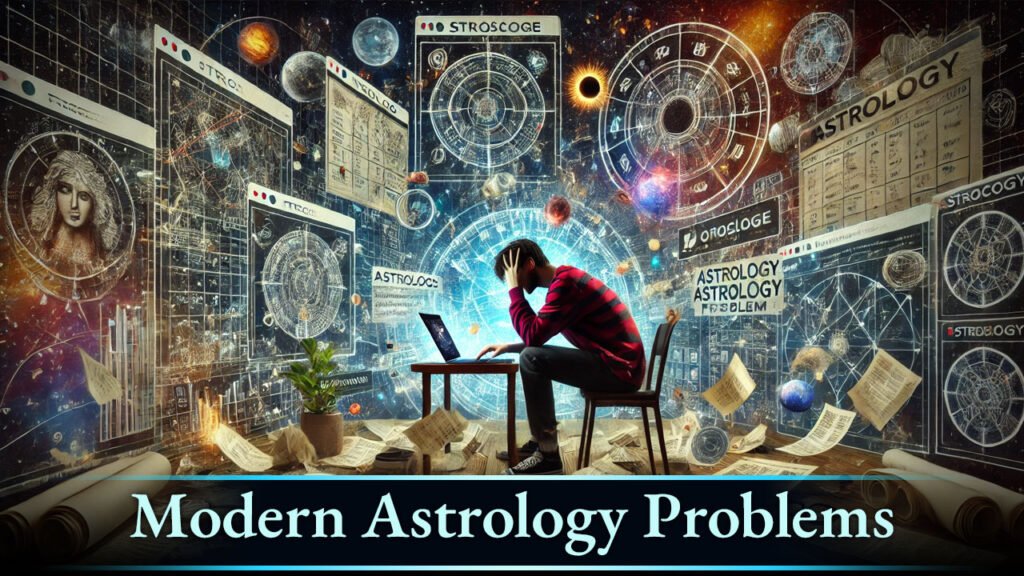Introduction to Modern Astrology Problems
Astrology, particularly in its modern form, has seen a resurgence in popularity in recent years. With the rise of social media platforms, astrology apps, and meme culture, it has become more accessible than ever before. However, this widespread adoption has also brought with it several challenges and pitfalls. While Modern Astrology Problems can offer insights into personality traits, life patterns, and potential challenges, modern interpretations often oversimplify or misrepresent its complexities. In this article, we will explore some of the key problems and pitfalls associated with modern astrology.
Read Also: Astrology Fixes for Marriage Woes
1. Over-Simplification of Complex Systems
One of the most significant issues with modern Modern Astrology Problems is the tendency to oversimplify ancient systems like Vedic (Hindu) astrology or Western astrology. Many popular astrology apps and online platforms reduce intricate astrological charts to basic sun-sign horoscopes, ignoring the nuanced interplay of planets, houses, aspects, and Nakshatras (in Vedic astrology).
- Sun-Sign Astrology: Modern astrology often focuses solely on sun signs (e.g., Aries, Taurus, Gemini), which represent only one aspect of a person’s natal chart. This narrow focus fails to account for the influence of other planets, such as the Moon, Mars, or Saturn, which play crucial roles in shaping an individual’s personality and life path.
- Lack of Context: Without considering the full birth chart, including the Ascendant (rising sign) and planetary positions at the time of birth, predictions and readings can be vague or inaccurate. For example, two people born under the same sun sign may have vastly different experiences due to differences in their moon signs, ascendants, and planetary placements.
2. Commercialization and Superficiality
Modern astrology has become highly commercialized, with countless apps, websites, and social media influencers offering daily horoscopes, compatibility tests, and “astrological advice.” While these platforms make astrology more accessible, they often prioritize entertainment over depth, leading to superficial interpretations.
- Astrology as Entertainment: Many modern Modern Astrology Problems platforms cater to casual users who are looking for quick, fun insights rather than serious study. Horoscopes are often written in vague, generalized terms that apply to almost anyone, a phenomenon known as the “Barnum Effect.” This can lead to a lack of trust in astrology as a meaningful system of self-reflection.
- Astrology Merchandising: The commercialization of astrology has led to the proliferation of astrology-themed products, from jewelry to clothing to home decor. While these items may appeal to those interested in astrology, they often dilute its deeper spiritual and philosophical meanings.
For interesting astrology-related videos, subscribe to us on YouTube
3. Misinterpretation of Planetary Influences
Modern Modern Astrology Problems frequently misinterprets or exaggerates the influence of certain planets, especially when it comes to predicting major life events or personality traits. This can lead to confusion, anxiety, or even fatalism among those who take these predictions too seriously.
- Fear-Based Predictions: Some modern astrologers emphasize negative planetary transits (e.g., Saturn Return, Mercury Retrograde) without providing constructive advice on how to navigate these periods. This can create unnecessary fear and stress, especially for individuals who are new to Modern Astrology Problems and may not understand the broader context.
- Overemphasis on Retrogrades: Mercury retrograde, in particular, has become a cultural phenomenon, with many people blaming it for everything from communication breakdowns to technological glitches. While retrogrades can indeed bring challenges, they are also opportunities for reflection, reassessment, and growth. Modern astrology often overlooks these positive aspects.
4. Lack of Cultural Sensitivity
Modern astrology often borrows elements from various traditions, including Vedic (Hindu) astrology, Chinese astrology, and Western astrology, without fully understanding or respecting their cultural and historical contexts. This can lead to the misappropriation of sacred practices and symbols.
- Cultural Appropriation: For example, Vedic Modern Astrology Problems is deeply rooted in Hindu philosophy, spirituality, and Ayurveda. When modern astrologers adopt Vedic concepts (such as Nakshatras or Dasha systems) without acknowledging their origins, they risk stripping these traditions of their cultural significance.
- Mixing Systems: Some modern astrologers combine elements from different astrological systems (e.g., using Vedic concepts like Nakshatras alongside Western tropical zodiac signs) without understanding the fundamental differences between them. This can lead to inconsistent or contradictory interpretations.
5. Confirmation Bias and Self-Fulfilling Prophecies
Astrology, like any belief system, is susceptible to confirmation bias—the tendency to interpret information in a way that confirms pre-existing beliefs. Modern astrology often reinforces this bias by providing vague, general statements that people can easily relate to their own lives.
- Self-Fulfilling Prophecies: If someone reads a horoscope that predicts a challenging day, they may subconsciously act in ways that fulfill that prediction, such as expecting conflicts or avoiding opportunities. Similarly, if a compatibility test suggests a relationship will fail, individuals may unconsciously sabotage the relationship based on that belief.
- Over-Reliance on Astrology: Some people may become overly dependent on astrology for decision-making, relying on horoscopes or birth charts to guide every aspect of their lives. This can lead to a lack of personal agency and critical thinking.
6. Scientific Skepticism and Lack of Empirical Evidence
Astrology has long been a subject of skepticism within the scientific community, and modern astrology faces similar scrutiny. Critics argue that there is no empirical evidence to support the claims made by astrologers, and many studies have failed to find a causal link between celestial movements and human behavior.
- Pseudoscience Label: Modern astrology is often dismissed as pseudoscience because it lacks rigorous testing and reproducibility. While astrology may provide valuable insights into human psychology and behavior, it is not currently recognized as a scientific discipline.
- Misunderstanding of Science: Some proponents of modern astrology attempt to validate it using scientific language or theories (e.g., quantum physics, gravitational forces), but these explanations are often flawed or misinterpreted. This can further alienate astrology from mainstream acceptance.
7. Neglect of Free Will and Personal Responsibility
One of the core principles of traditional astrology, particularly Vedic astrology, is the balance between fate (Karma) and free will. However, modern astrology often emphasizes fate over free will, leading to a sense of helplessness or resignation.
- Fatalism: When people believe that their lives are entirely dictated by planetary influences, they may feel powerless to change their circumstances. This can discourage personal growth, proactive decision-making, and accountability.
- Ignoring Karma: In Vedic astrology, the concept of Karma plays a central role in understanding life’s challenges and opportunities. Modern astrology often neglects this aspect, focusing instead on immediate outcomes or short-term predictions.
Read Also:https://hanishbagga.com/astrology/success-with-astrology/
8. Inconsistent Standards Among Practitioners
The field of modern astrology is largely unregulated, meaning anyone can claim to be an astrologer regardless of their level of training or expertise. This lack of standardization leads to inconsistent quality and reliability in astrological readings.
- Unqualified Practitioners: Many so-called astrologers lack formal education in astrology and rely on automated software or superficial knowledge to generate charts and predictions. This can result in inaccurate or misleading advice.
- Ethical Concerns: Some practitioners exploit vulnerable individuals by making exaggerated claims or charging exorbitant fees for services. This unethical behavior undermines the credibility of astrology as a whole.
Read Also: Astrology for Marriage Bliss
Conclusion of Modern Astrology
While modern astrology offers a gateway to self-discovery and introspection, it is important to approach it with discernment and critical thinking. By recognizing its limitations and avoiding the pitfalls outlined above, individuals can use astrology as a tool for personal growth rather than a source of anxiety or dependency.
To maximize the benefits of astrology:
- Seek out qualified practitioners who respect the depth and complexity of astrological traditions.
- Study your full birth chart rather than relying solely on sun-sign horoscopes.
- Use astrology as a guide for reflection and self-awareness, not as a substitute for professional advice or personal responsibility.
- Be mindful of cultural sensitivity and avoid appropriating sacred practices without understanding their origins.
Ultimately, astrology—whether modern or traditional—is most effective when used as a complementary practice that enhances, rather than replaces, rational decision-making and holistic well-being. By navigating its challenges thoughtfully, we can harness the wisdom of the stars while staying grounded in reality.

